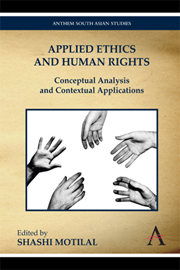Book contents
- Frontmatter
- Contents
- Preface
- Introduction
- Part One Rights, Obligations and Responsibilities
- 1 Applying Ethics: Modes, Motives and Levels of Commitment
- 2 Jurisprudence and the Individual: Bridging the General and the Particular
- 3 Why Moral Relativism Does Not Make Sense
- 4 Human Rights – A Theoretical Foray
- 5 Moral Relativism and Human Rights
- 6 Complicity and Responsibility
- 7 Dharma: The Overriding Principle of Indian Life and Thought
- 8 Moral Foundations of Social Order as Suggested in the Vaiśeṣikasūtras
- 9 Modern Western Conception of Justice as Equality before the Law and Dharmaśāstras
- Part Two Human Rights Issues
- Notes on Contributors
3 - Why Moral Relativism Does Not Make Sense
from Part One - Rights, Obligations and Responsibilities
Published online by Cambridge University Press: 05 March 2012
- Frontmatter
- Contents
- Preface
- Introduction
- Part One Rights, Obligations and Responsibilities
- 1 Applying Ethics: Modes, Motives and Levels of Commitment
- 2 Jurisprudence and the Individual: Bridging the General and the Particular
- 3 Why Moral Relativism Does Not Make Sense
- 4 Human Rights – A Theoretical Foray
- 5 Moral Relativism and Human Rights
- 6 Complicity and Responsibility
- 7 Dharma: The Overriding Principle of Indian Life and Thought
- 8 Moral Foundations of Social Order as Suggested in the Vaiśeṣikasūtras
- 9 Modern Western Conception of Justice as Equality before the Law and Dharmaśāstras
- Part Two Human Rights Issues
- Notes on Contributors
Summary
In this paper I would like to examine the presuppositions of moral relativism and suggest that moral relativism, like any other relativism, does not hold good because of certain conceptual oddities involved in it. To argue that moral values are relative to cultures and societies and that morality is culture-variant is wrong because there are moral values which cut across all cultures and societies. Moral ideals and principles are not products of culture because culture itself presupposes them. Hence it is more appropriate to argue that morality has a core that does not change with history and culture.
What is Moral Relativism?
Moral relativism is the moral theory that says that moral values are of cultural origin and that they are relative to the cultures in which they are expressed. That is to say, moral values are culture-variant and they cannot be shared by all cultures. This argument regarding the nature and origin of moral values admits the relativity of moral ideals and values and reduces them to certain cultural practices or at best to some cultural ideals which are specific to some historical contexts. This is how cultural relativism has been identified with moral relativism in recent times. (Matilal 1994)
The strongest argument for moral relativism is that moral values are mancentric and that they arise due to historical and cultural needs of mankind. Thus moral values are no exception to the general historical and cultural situation which controls and conditions our life.
- Type
- Chapter
- Information
- Applied Ethics and Human RightsConceptual Analysis and Contextual Applications, pp. 51 - 56Publisher: Anthem PressPrint publication year: 2010



